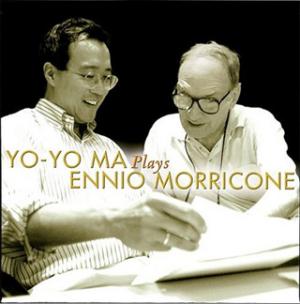************************************************************** EDITOR’s RECOMMENDATION September 2004 **************************************************************
Yo-Yo Ma plays
Ennio Morricone
Available on Sony Classical SK 093456
Running time: 62.20
Amazon UK Amazon US

See also:
- A Fistful of Sounds
- Once Upon A Time in America
- The Legend of 1900
- Crouching Tiger, Hidden Dragon
- Seven Years in Tibet
For track listing see below this review.
Cellist Yo-Yo Ma is a musician who recognises no boundaries, only good music. Conventionally thought of as a "classical musician" (and he is one of the finest in the world) he is as at home performing Asian / ethnic / World music – as his recent Proms concert with The Silk Road Ensemble, which I was fortunate enough to attend, aptly demonstrated. Yet his catalogue also extends to two collaborative albums of Appalachian folk-Americana, a disc of Brazilian music and several film soundtracks, most notably his unforgettable contributions to Crouching Tiger, Hidden Dragon and John Williams' Seven Years in Tibet (1997). Ma has also released Yo-Yo Ma Plays the music of John Williams, which includes four concert works including a concerto written expressly for the cellist.
To quote the publicity material. "The genesis for this recording began during the Academy Awards in 2001, when Yo-Yo Ma was performing the Academy Award-winning score for Crouching Tiger, Hidden Dragon on the Oscar telecast, and met Morricone, who was also in attendance for his Oscar-nominated score Malèna. Their initial encounter ultimately resulted in Morricone reimagining many of his most famous melodies in new orchestral treatments that feature the cello."
Clearly this is not a soundtrack album, but a reworking which uses some of Ennio Morricone's most famous themes as the basis for new symphonic arrangements which blur the line between classical and film music. The album offers eight tracks, Morricone combining music from different films by the same director into a series of suites, as well as providing shorter arrangements of individual themes. Most of Morricone's most popular melodies are here, stripped of their original arrangements and refashioned as lush pseudo-classical pieces. The most obvious changes have come in the pieces which originally had the most eclectic, at times electric, arrangements, such as The Good, The Bad and The Ugly. Elsewhere the changes are more a matter of reworking the music from its original solo voice to suit the cello – whether the oboe and panpipes of The Mission or the soprano voice of Once Upon A Time in America. The music is thus much closer in sensibility to the lavishly romantic Morricone of recent decades rather than the more idiosyncratic composer of earlier years.
Bittersweet, nostalgic and romantic this album may be, but one word sums it up more than any, and that word is "ravishing". It is as if the qualities of rapturous beauty and impassioned yearning so bellowed of Morricone's many fans have been taken to a higher level of intensity by the artistry of Yo-Yo Ma. While the disc features such gems as the theme from The Legend of 1900 arranged for cello and piano, the album contains simply staggering music-making in the intense readings of the theme from Marco Polo and the 'Ecstasy of Gold' cue from The Good, The Bad and The Ugly. These alone make the disc worthy of purchase, but really there isn't a moment here which isn't musical gold. I could go on, and on, and on about how wonderful this disc is, but you owe it to yourself to discover the pleasures for yourself. This is easily the best reworking, of many I have heard, of Ennio Morricone's music, and sets a new standard for this sort of crossover project.
The promo copy submitted for review offered no information about orchestra, but the musicianship is impeccable, and the sound is demonstration quality.
Gary Dalkin
5
Track listing:
- The Mission
Gabriel's Oboe / The Falls (5.38)- Giuseppe Tornatore Suite (13.42)
Love Theme from The Legend of 1900
Nostalgia from Cinema Paradiso
Looking for You (Love Theme) from Cinema Paradiso
Malena (Main theme) Remembering (Ricordare) from A Pure Formality
- Sergio Leone Suite (14.52)
Deborah's Theme from Once Upon A Time In America
Cockeye's Song from Once Upon a Time in America
Main Theme from Once Upon a Time in America
Main Theme from Once Upon a Time in the West
Ecstasy of Gold from The Good, the Bad, and the Ugly- Brian DePalma Suite (7.03)
Main Theme from Causalities of War/I>
Death Theme from The Untouchables- Moses and Marco Polo Suite (8.03)
Journey from Moses
Theme from Moses
Main Theme from Marco Polo
- The Lady Caliph (6.22)
Dinner
Nocturne- The Legend of 1900 – theme (cello and piano) (1.45)
- The Mission – theme (cello and piano) (4.26)
Return to Index